Ketanji Brown Jackson confirmed as first Black female high court justice
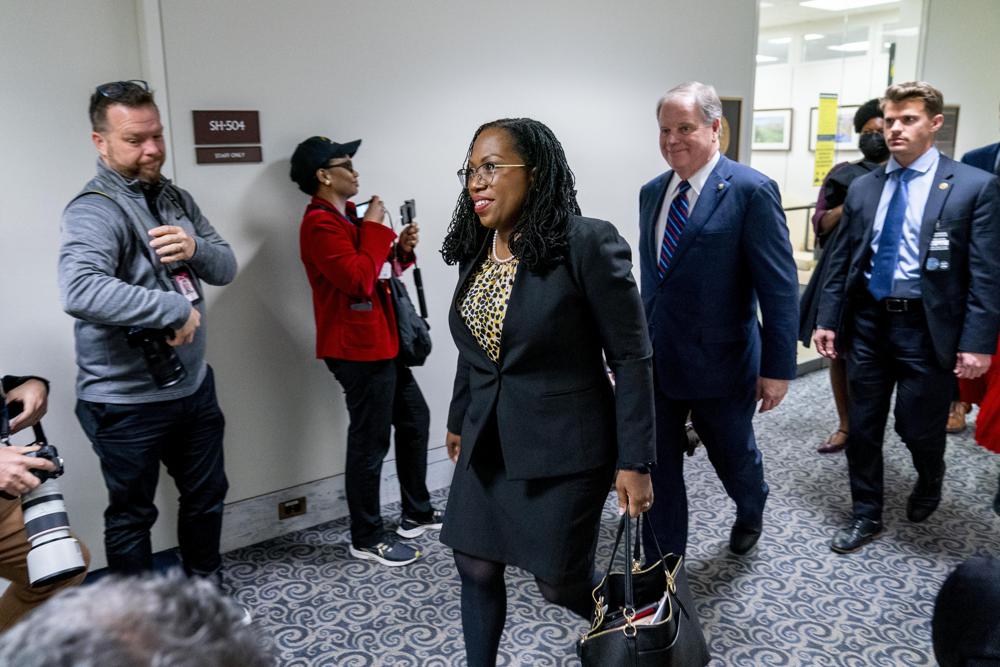
The Senate confirmed Ketanji Brown Jackson to the Supreme Court on Thursday, shattering a historic barrier by securing her place as the first Black female justice and giving President Joe Biden a bipartisan endorsement for his promised effort to diversify the high court. Cheers rang out in the Senate chamber as Jackson, a 51-year-old appeals court judge with nine years of experience on the federal bench, was confirmed 53-47, mostly along party lines but with three Republican votes. Presiding over the vote was Vice President Kamala Harris, also the first Black woman to reach her high office. Biden tweeted afterward that “we’ve taken another step toward making our highest court reflect the diversity of America.” Senate Majority Leader Chuck Schumer exulted that it was “a wonderful day, a joyous day, an inspiring day — for the Senate, for the Supreme Court, and for the United States of America.” Harris said as she left the Capitol that she was “overjoyed, deeply moved.” Jackson will take her seat when Justice Stephen Breyer retires this summer, solidifying the liberal wing of the 6-3 conservative-dominated court. She joined Biden at the White House to watch the vote, embracing as it came in. The two were expected to speak, along with Harris, at the White House Friday. During four days of Senate hearings last month, Jackson spoke of her parents’ struggles through racial segregation and said her “path was clearer” than theirs as a Black American after the enactment of civil rights laws. She attended Harvard University, served as a public defender, worked at a private law firm, and was appointed as a member of the U.S. Sentencing Commission. She told senators she would apply the law “without fear or favor,” and pushed back on Republican attempts to portray her as too lenient on criminals she had sentenced. Jackson will be just the third Black justice, after Thurgood Marshall and Clarence Thomas, and the sixth woman. She will join three other women, Sonia Sotomayor, Elena Kagan, and Amy Coney Barrett – meaning that four of the nine justices will be women for the first time in history. Her eventual elevation to the court will be a respite for Democrats who fought three bruising battles over former President Donald Trump’s nominees and watched Republicans cement a conservative majority in the final days of Trump’s term with Barrett’s confirmation. While Jackson won’t change the balance, she will secure a legacy on the court for Biden and fulfill his 2020 campaign pledge to nominate the first Black female justice. “This is a tremendously historic day in the White House and in the country,” said White House press secretary Jen Psaki after the vote. “And this is a fulfillment of a promise the president made to the country.” The atmosphere was joyful, though the Senate was divided, as Thursday’s votes were cast. Senators of both parties sat at their desks and stood to vote, a tradition reserved for the most important matters. The upper galleries were almost full for the first time since the beginning of the pandemic two years ago, and about a dozen House members, part of the Congressional Black Caucus, stood at the back of the chamber. Harris called out the tally, pausing with emotion, and Democrats erupted in loud applause and cheers, Schumer pumping his fists. A handful of Republicans stayed and clapped, but most by then had left. Despite Republican criticism of her record, Jackson eventually won three GOP votes. The final tally was far from the overwhelming bipartisan confirmations for Breyer and other justices in decades past, but it was still a significant accomplishment for Biden in the 50-50 split Senate after GOP senators aggressively worked to paint Jackson as too liberal and soft on crime. Statements from Republican Sens. Susan Collins of Maine, Lisa Murkowski of Alaska, and Mitt Romney of Utah all said the same thing — they might not always agree with Jackson, but they found her to be enormously well qualified for the job. Collins and Murkowski both decried increasingly partisan confirmation fights, which only worsened during the battles over Trump’s three picks. Collins said the process was “broken,” and Murkowski called it “corrosive” and “more detached from reality by the year.” Biden, a veteran of a more bipartisan Senate, said from the day of Breyer’s retirement announcement in January that he wanted support from both parties for his history-making nominee, and he invited Republicans to the White House as he made his decision. It was an attempted reset from Trump’s presidency, when Democrats vociferously opposed the three nominees, and from the end of President Barack Obama’s when Republicans blocked nominee Merrick Garland from getting a vote. Once sworn in, Jackson will be the second-youngest member of the court after Barrett, 50. She will join a court on which no one is yet 75, the first time that has happened in nearly 30 years. Jackson’s first term will be marked by cases involving race, both in college admissions and voting rights. She has pledged to sit out the court’s consideration of Harvard’s admissions program since she is a member of its board of overseers. But the court could split off a second case involving a challenge to the University of North Carolina’s admissions process, which might allow her to weigh in on the issue. Judith Browne Dianis, executive director of the Advancement Project, a civil rights organization, said Jackson will make the court more reflective of communities that are most impacted by the judiciary. “The highest court in the land now will have a firsthand perspective of how the law impacts communities of color — via voting rights, police misconduct, abortion access, housing discrimination, or the criminal legal system, among other issues,” she said. “This will ultimately benefit all Americans.” Jackson could wait as long as three months to be sworn in, as the court’s session generally ends in late June or early July. She remains a judge on the federal appeals court in Washington, but she stepped away from cases there when she was nominated in February. Republicans spent
Ketanji Brown Jackson on track for confirmation, but GOP votes in doubt
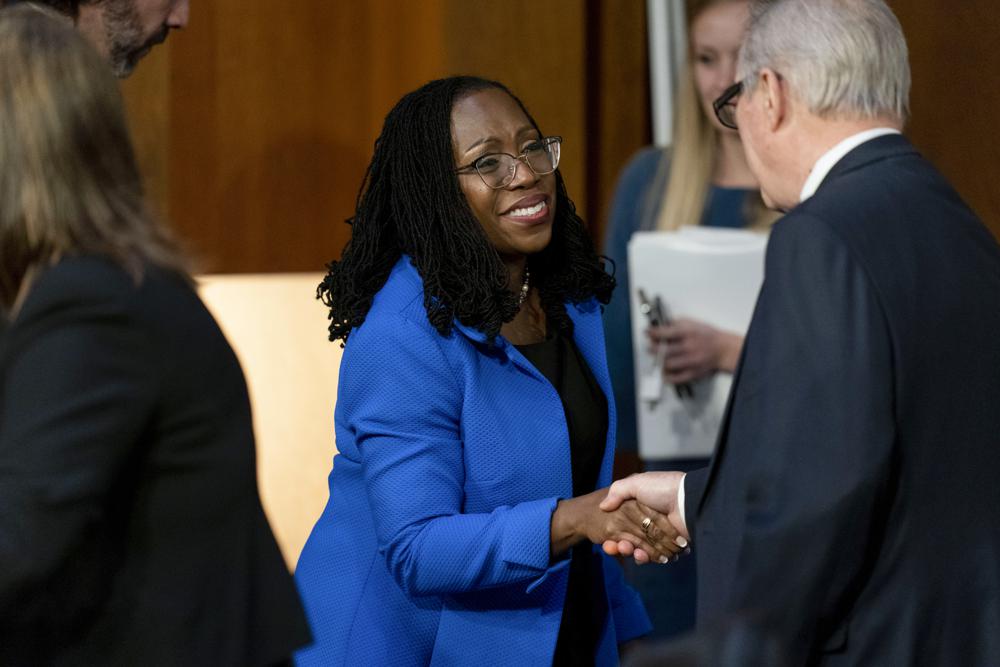
After more than 30 hours of hearings, the Senate is on track to confirm Ketanji Brown Jackson as the first Black woman on the Supreme Court. But Democrats seem unlikely to confirm her with a robust bipartisan vote, dashing President Joe Biden’s hopes for a grand reset after partisan battles over other high court nominees. On Thursday, just hours after the hearings came to a close, Senate Republican Leader Mitch McConnell announced he will vote against Jackson’s confirmation. He said in a Senate floor speech that he “cannot and will not” support her for a lifetime appointment. McConnell slammed the liberal groups that have supported Jackson, and he criticized her for refusing to take a position on the size of the nine-member court, even though that decision is ultimately up to Congress. Some advocacy groups have pushed for enlarging the court after three justices nominated by former President Donald Trump cemented a 6-3 conservative majority. McConnell also cited concerns about her sentencing of criminal defendants — a subject that dominated much of the four days of hearings and was part of a coordinated GOP effort to portray her as soft on crime. His position was expected and does not affect Jackson’s trajectory to be confirmed by mid-April. But the leader’s quick declaration could prompt many of his fellow Republicans to follow suit, thwarting Biden’s efforts to bring back the overwhelming bipartisan votes that were commonplace for Supreme Court nominees when he first came to the Senate five decades ago. “I think whomever I pick will get a vote from Republican side,” Biden said after Justice Stephen Breyer announced he would step down from the court this summer. As he started his search for a replacement, the president made a point of inviting Republican senators to the White House to hear their advice. While many GOP senators have praised Jackson’s vast experience and qualifications, it was clear at the hearings that Biden’s outreach had little effect. Republicans on the Senate Judiciary Committee interrogated Jackson about her nine-year record as a federal judge, frequently interrupting her answers. Jackson, supported by committee Democrats, pushed back aggressively on Republicans who said she gave light sentences to sex offenders, explaining her sentencing process in detail and telling them “nothing could be further from the truth.” The focus on crime dovetails with an emerging GOP theme for this year’s midterm elections and is likely to be decisive for many Republican senators. Others have brought up separate reasons to vote against her — from her support from liberal groups to her so-called “judicial philosophy.” One or more Republicans could still cast a vote for Jackson’s confirmation, but the contentious nature of the four-day hearings laid bare a familiar partisan dynamic, seen over years of pitched fighting over judicial nominations. Senate Judiciary Committee Chairman Dick Durbin, who has been privately lobbying GOP colleagues to support Jackson, said after McConnell’s announcement that it will be “sad for our country and sad as a commentary on where the parties are today” if her historic nomination is approved on a strictly partisan vote. “The Republicans are testing their messages for the November election,” Durbin said. Durbin said he is “still hoping that several Republicans — I hope many more” will vote for her. If not, Democrats can confirm Jackson without any GOP support in the 50-50 Senate, with Vice President Kamala Harris breaking a tie. As talk turned to the voting ahead, the Judiciary panel held its final day of Senate hearings Thursday with a top lawyers’ group, which said its review found Jackson has a “sterling” reputation and “exceptional” competence and is well qualified to sit on the Supreme Court. “Outstanding, excellent, superior, superb,” testified Ann Claire Williams, chair of the American Bar Association committee that makes recommendations on federal judges. “Those are the comments from virtually everyone we interviewed.” Williams said the group spoke to more than 250 judges and lawyers about Jackson. “The question we kept asking ourselves: How does one human being do so much so extraordinary well?” Jackson would be the third Black justice, after Thurgood Marshall and Clarence Thomas, and the sixth woman. She would also be the first former public defender on the court, and the first justice with experience representing indigent criminal defendants since Marshall. Her confirmation would not alter the current 6-3 conservative majority on the court. Durbin noted at Thursday’s hearing that some Republican senators argued that Jackson was out of the mainstream when it comes to sentencing, and he asked the ABA whether such a concern would have surfaced in their interviews with the judges and lawyers who worked with her. “It never came up in any of these interviews,” Williams said. During questioning Tuesday and Wednesday, GOP senators aggressively queried Jackson on the sentences she handed down to child pornography offenders in her nine years as a federal judge, her legal advocacy on behalf of suspected terrorists held at Guantanamo Bay, her thoughts on critical race theory, and even her religious views. Many of the hours of questioning were spent on the specifics of the child pornography cases, with the discussion led by several GOP senators who are eyeing the presidency. Pushing back, Jackson said she bases sentences on many factors, not just federal guidelines. Sentencing is not a “numbers game,” she said, noting that there are no mandatory sentences for sex offenders and that there has been significant debate on the subject. Democratic senators cited outside experts who said her sentences were within the norm. Some of those cases have given her nightmares, Jackson said, and were “among the worst that I have seen.” The GOP criticism was countered by effusive praise from Democrats and by reflections on the historic nature of her nomination. The most riveting came from New Jersey Sen. Cory Booker, who used his time Wednesday not to ask questions but to tearfully speak and draw tears from Jackson as well. Booker, who is Black, said he sees “my ancestors and yours” when he looks at Jackson. “I know what it’s taken
Ketanji Brown Jackson seems headed for confirmation, says no ‘agendas’
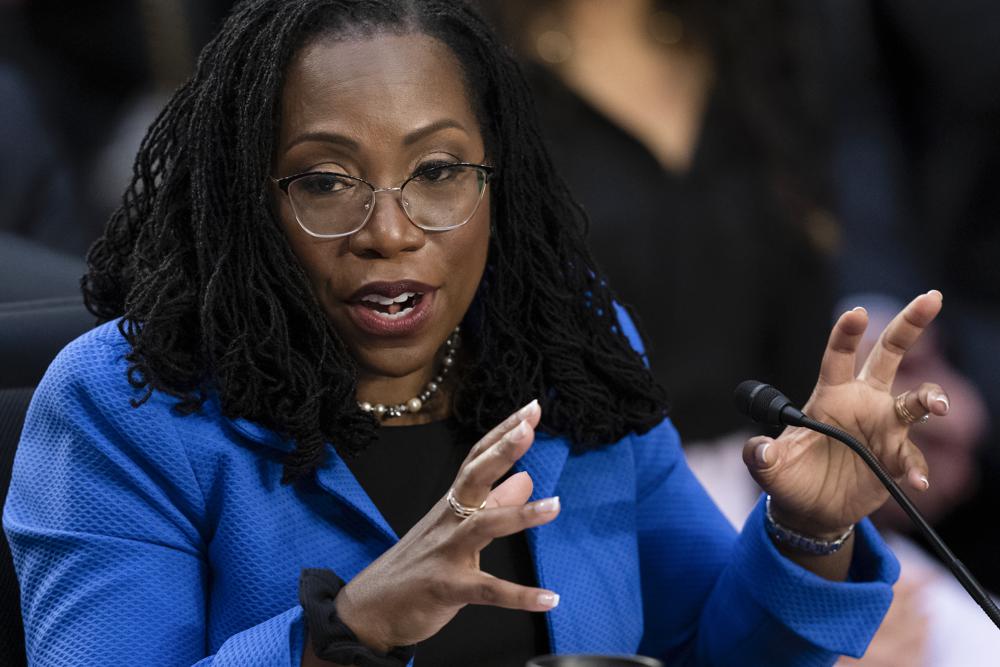
Judge Ketanji Brown Jackson faced a barrage of Republican questioning Wednesday about her sentencing of criminal defendants, as her history-making bid to join the Supreme Court veered from lofty constitutional questions to attacks on her motivations as a judge. She declared she would rule “without any agendas” as the high court’s first Black female justice, rejecting Republican efforts to paint her as soft on crime in her decade on the federal bench. Democrats defended her and heralded the historic nature of her nomination. “America is ready for the Supreme Court glass ceiling to shatter,” Sen. Dick Durbin, the chairman of the Senate Judiciary Committee, said in Jackson’s second and last day answering questions at her confirmation hearings. Though her approval seems all but sure — Democrats are aiming for a vote before Easter — Republicans keep trying to chip away at her record. In more than 12 hours of testimony on Tuesday, and long into the day on Wednesday, GOP senators aggressively questioned her on the sentences she has handed down to child pornography offenders, her legal advocacy on behalf of terror suspects at Guantanamo Bay, her thoughts on critical race theory and even her religious views. In response to questioning about a case over affirmative action at Harvard University, her alma mater where she now serves on the Board of Overseers, Jackson said she would recuse herself. “That’s my plan,” she responded when Texas Sen. Ted Cruz asked her about it. The court will, in the fall, take up challenges to the consideration of race in college admissions in lawsuits filed by Asian American applicants to Harvard, a private institution, and the University of North Carolina, a state school. The court currently plans to hear the suits against the two schools together but could separate them and give Jackson a chance to take part in what will be one of next term’s biggest issues. Tempers rose at Wednesday’s hearing as the day wore on, with Durbin slamming down his gavel at one point when Cruz refused to yield after his time expired while he was grilling Jackson on the specifics of cases. “You can bang it as long as you want,” Cruz snapped, shouting that he just wanted Jackson to answer his question. “At some point, you have to follow the rules,” Durbin shot back. In another round of tense questioning, South Carolina Sen. Lindsey Graham interrogated Jackson on the punishment she believes appropriate for people convicted of child pornography. Like Cruz and others on the committee, Graham said she had been too lenient on those criminals. Graham frequently interrupted her as she tried to speak; at one point, he said judges should simply “put their a— in jail!” The focus on her sentencing was part of a larger effort by the committee’s Republicans — several of whom are potential presidential candidates — to characterize Jackson’s record and her judicial philosophy as too empathetic and soft on criminals who commit the worst offenses. It was also part of an emerging emphasis on crime in GOP midterm election campaigns. North Carolina Sen. Thom Tillis said she seemed like “a very kind person” — but “there’s at least a level of empathy that enters into your treatment of a defendant that some could view as maybe beyond what some of us would be comfortable with, with respect to administering justice.” The sustained focus on her record suggested that, contrary to Democratic hopes, Jackson’s confirmation vote in the full Senate is unlikely to garner much, if any, Republican support. Still, several Republicans acknowledged that she is likely to be on the court. Democrats can confirm her without any bipartisan support in the 50-50 Senate as Vice President Kamala Harris can cast the tie-breaking vote. Jackson, backed by committee Democrats, forcefully defended her record and said that the Republicans were mischaracterizing her decisions. Asked if her rulings were endangering children, she told the committee on Tuesday: “Nothing could be further from the truth.” She said she bases sentences on many factors, not just federal guidelines. Sentencing is not a “numbers game,” she said, noting that there are no mandatory sentences for sex offenders and that there has been significant debate on the subject. Some of the cases have given her nightmares, she said, and were “among the worst that I have seen.” Jackson said that if she is confirmed, she will do what she has done as a federal judge, “which is to rule from a position of neutrality, to look carefully at the facts and the circumstances of every case without any agendas, without any attempt to push the law in one direction or the other.” She reminded the committee that her brother and two uncles served as police officers and that “crime and the effect on the community, and the need for law enforcement — those are not abstract concepts or political slogans to me.” Defending her, Democratic Sen. Chris Coons of Delaware told Jackson that the Republican lines of questioning are “an attempt to distract from your broad support, your deep record, your outstanding intellectual and legal credentials.” President Joe Biden chose Jackson in February, fulfilling a campaign pledge to nominate a Black woman to the Supreme Court for the first time in American history. She would take the seat of Justice Stephen Breyer, who announced in January that he would retire this summer after 28 years on the court. Jackson would be the third Black justice, after Thurgood Marshall and Clarence Thomas, and the sixth woman. Her confirmation would maintain the current 6-3 conservative majority on the court. Democrats have been full of praise for Jackson, noting that she would not only be the first Black woman but also the first public defender on the court and the first with experience representing indigent criminal defendants since Marshall. Jackson said that having a diverse judicial branch is important because it “bolsters public confidence in our system” and “lends confidence that the rulings that the court is handing down are fair and just.” She spoke of her parents often
Ketanji Brown Jackson pledges to decide cases ‘without fear or favor’
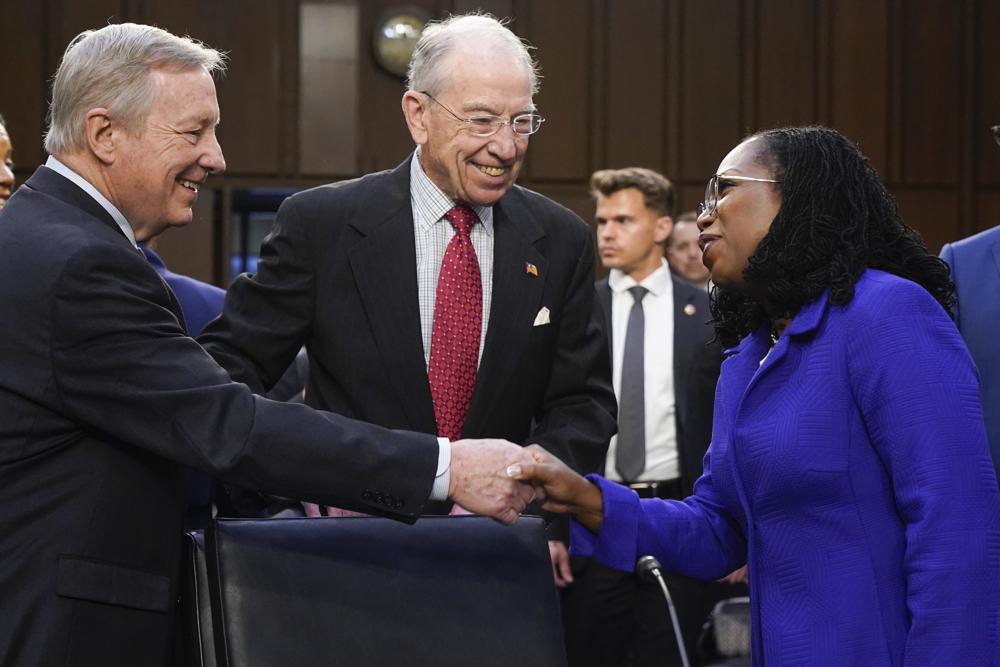
Supreme Court nominee Ketanji Brown Jackson pledged Monday to decide cases “without fear or favor” if the Senate confirms her historic nomination as the first Black woman on the high court. Jackson, 51, thanked God and professed love for “our country and the Constitution” in a 12-minute statement to the Senate Judiciary Committee at the end of her first day of confirmation hearings, nearly four hours almost entirely consumed by remarks from the panel’s 22 members. Republicans promised pointed questions over the coming two days, with a special focus on her record on criminal matters. Democrats were full of praise for President Joe Biden’s Supreme Court nominee. With her family sitting behind her, her husband in socks bearing George Washington’s likeness, Jackson stressed that she has been independent, deciding cases “from a neutral posture” in her nine years as a judge, and that she is ever mindful of the importance of that role. “I have dedicated my career to ensuring that the words engraved on the front of the Supreme Court building — equal justice under law — are a reality and not just an ideal,” she declared. Barring a significant misstep, Democrats who control the Senate by the slimmest of margins intend to wrap up her confirmation before Easter. She would be the third Black justice, after Thurgood Marshall and Clarence Thomas, as well as the first Black woman on the high court. Jackson’s sternest Republican critics, as well as her Democratic defenders, all acknowledged the historic, barrier-breaking nature of her presence. There were frequent reminders that no Black woman had been nominated to the high court before her and repeated references to another unique aspect of her nomination: Jackson is the first former public defender nominated to be a justice. “It’s not easy being the first. Often, you have to be the best, in some ways the bravest,” Democratic Sen. Dick Durbin of Illinois, the committee chairman, said in support. Sen. Cory Booker, D-N.J., spoke of the “joy” in the room and acknowledged her family’s pride as Jackson’s parents beamed behind her. Booker repeated a story Jackson has frequently told about a letter her youngest daughter wrote to President Barack Obama several years ago touting her mother’s experience. “We are going to see a new generation of children talking about their mamas and daring to write the president of the United States that my mom should be on the Supreme Court,” Booker said. “I want to tell your daughter right now, that dream of hers is so close to being a reality.” In their opening statements, Democrats sought to preemptively rebut Republican criticism of her record on criminal matters as a judge and before that as a federal public defender and a member of the U.S. Sentencing Commission. Jackson “is not anti-law enforcement” and is not “soft on crime,” Sen. Patrick Leahy, D-Vt., said, noting that members of Jackson’s family have worked in law enforcement and that she has support from some national law enforcement organizations. ”Judge Jackson is no judicial activist.” The committee’s senior Republican, Sen. Chuck Grassley of Iowa, promised Republicans would “ask tough questions about Jackson’s judicial philosophy” without turning the hearings into a ”spectacle.” Sen. Lindsey Graham, R-S.C., noted that Democrats had opposed some past Republican judicial nominees who were Black or Hispanic, and he said that he and his GOP colleagues wouldn’t be deterred by Jackson’s race from asking probing questions. He said of some criticism from the left: “It’s about, ‘We’re all racist if we ask hard questions.’ That’s not going to fly with us.” Graham was one of three Republicans to support Jackson’s confirmation, 53-44, as an appellate judge last year. But he has indicated over the past several weeks that he is unlikely to vote for her again. While few Republicans are likely to vote for her, most GOP senators did not aggressively criticize Jackson, whose confirmation would not change the court’s 6-3 conservative majority. Several Republicans used their time to denounce Senate Democrats instead of Jackson’s record. The Republicans are trying to use her nomination to brand Democrats as soft on crime, an emerging theme in GOP midterm election campaigns. Biden has chosen several former public defenders for life-tenured judicial posts. In addition, Jackson served on the U.S. Sentencing Commission, an independent agency created by Congress to reduce disparity in federal prison sentences. With Jackson silently taking notes, Sen. Josh Hawley, R-Mo., said in his opening statement that his research showed that she had a pattern of issuing lower sentences in child pornography cases, repeating comments he wrote in a Twitter thread last week. The Republican National Committee echoed his claims, which Hawley did not raise when he questioned Jackson last year before voting against her appeals court confirmation. The White House, along with several Democrats at the hearing, has rejected Hawley’s criticism as “toxic and weakly presented misinformation.” Former Alabama Sen. Doug Jones, who is guiding Jackson as she navigates the Senate process, told reporters afterward that “she will be the one to counter many of those questions” from Hawley and others on Tuesday and Wednesday. Hawley is one of several committee Republicans, along with Ted Cruz of Texas and Tom Cotton of Arkansas, who are potential 2024 presidential candidates, and their aspirations may collide with other Republicans who would prefer not to pursue a scorched-earth approach to Jackson’s nomination. Her testimony will give most Americans, as well as the Senate, their most extensive look yet at the Harvard-trained lawyer with a broader resume than many nominees. She would be the first justice with significant criminal defense experience since Marshall. Jackson appeared before the same committee last year, after Biden chose her to fill an opening on the federal appeals court in Washington, just down the hill from the Supreme Court. The American Bar Association, which evaluates judicial nominees, has given her its highest rating, “well qualified.” Biden chose Jackson in February, fulfilling a campaign pledge to nominate a Black woman to the Supreme Court for the first time in American history. She would take the seat of Justice
Mo Brooks vows to vote no on H.R. 3005
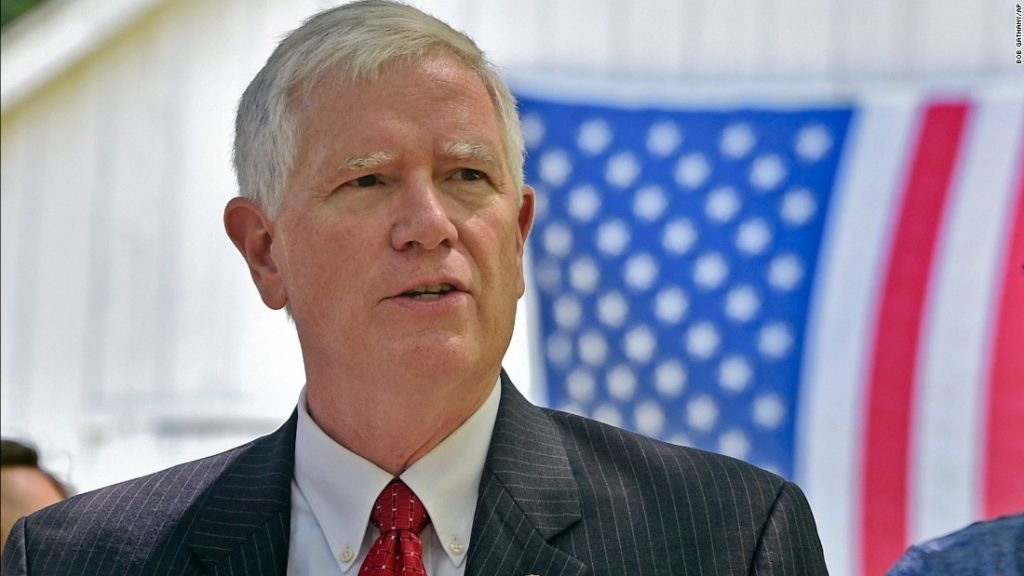
Tuesday, Congressman Mo Brooks announced Tuesday that he will vote “No” on H.R. 3005. The bill calls to replace the bust of Roger Brooke Taney in the Old Supreme Court Chamber of the United States Capitol with a bust of Thurgood Marshall. It also calls to remove certain statues from areas of the United States Capitol that are accessible to the public and remove all statues of individuals who voluntarily served the Confederate States of America from display in the United States Capitol. Chief Justice Taney became best known for writing the final majority opinion in Dred Scott v. Sandford in 1857. The court declared that African Americans were not citizens of the United States and could not sue in Federal courts. This decision further declared that Congress did not have the authority to prohibit slavery in the territories. H.R. 3005 states, “Chief Justice Roger Brooke Taney’s authorship of Dred Scott v. Sandford, the effects of which would only be overturned years later by the ratification of the 13th, 14th, and 15th Amendments to the Constitution of the United States, renders a bust of his likeness unsuitable for the honor of display to the many visitors to the United States Capitol.” The Bill also states, “While the removal of Chief Justice Roger Brooke Taney’s bust from the United States Capitol does not relieve the Congress of the historical wrongs it committed to protect the institution of slavery, it expresses Congress’s recognition of one of the most notorious wrongs to have ever taken place in one of its rooms, that of Chief Justice Roger Brooke Taney’s Dred Scott v. Sandford decision.” Rep. Brooks argues that the bill will allow other states to determine what statues other states can display. Currently, the U.S. Capitol’s National Statuary Collection has 100 statues, 2 from each state. Alabama’s two statutes are Helen Keller and Joe Wheeler. Wheeler was a Confederate general who later become a United States general. General Wheeler oversaw Teddy Roosevelt and the Rough Riders and is buried in Arlington National Cemetery. Alabama also has a third statute honoring Civil Rights leader Rosa Parks. Both the General Wheeler and Rosa Parks statutes are in places of prominence in the old House Chamber (now known as Statuary Hall). Helen Keller is prominently honored and displayed in the Capitol Visitor’s Center. The 1864 law establishing the National Statuary Collection provides that each state may “furnish statues…of deceased persons who have been citizens thereof, and illustrious for their historic renown or for distinguished civic or military services such as each State may deem to be worthy of this national commemoration.” Brooks stated, “The 1864 law that establishes the National Statuary Collection defers to states the power to determine who they wish to honor with a Capitol statue. And that makes perfect sense. Just as it would be wrong for Alabama and other states to dictate to New York and California who they must honor, it is similarly wrong and repulsive for New York, California, or other states to dictate to Alabama who we must honor. Yet, H.R. 3005 seeks to do exactly that by empowering other states to dictate to a single state who that state can, or cannot, honor.” Brooks continued, “Cancel culture and historical revisionism are precursors to dictatorial government and the destruction of individual liberty and freedom by elitists who claim they know more than regular citizens and, hence, should be empowered to dictate what regular citizens can and cannot think or do. Ultimately, it’s all about political power in the hands of a dictatorial few coupled with the loss of freedom and liberty by the masses. “I reject cancel culture and historical revisionism. I reject Socialist Democrat intolerance. I support federalism and a state’s right to decide for itself who it should honor. As such, I will proudly vote ‘No’ on H.R. 3005. Alabama, not New Yorkers, Californians, or anyone else, should decide who we wish to honor in Alabama’s contribution to the National Statuary Collection. Socialist Democrat states should butt out,” Brooks concluded. Brooks commented on Twitter, “Cancel culture & historical revisionism are precursors to dictatorial government & the destruction of individual liberty & freedom by elitists who claim they know more than regular citizens & should be able to dictate what regular citizens can think or do.” Cancel culture & historical revisionism are precursors to dictatorial government & the destruction of individual liberty & freedom by elitists who claim they know more than regular citizens & should be able to dictate what regular citizens can think or do. https://t.co/63HV28f1O6 — Mo Brooks (@RepMoBrooks) June 29, 2021 The House Press Gallery posted on Twitter earlier today, “A recorded vote was requested and postponed on H.R. 3005.” A recorded vote was requested and postponed on H.R. 3005. https://t.co/IxmDeJmzlN — House Press Gallery (@HouseDailyPress) June 29, 2021
Bruce Boynton, who inspired 1961 Freedom Rides, dies at 83
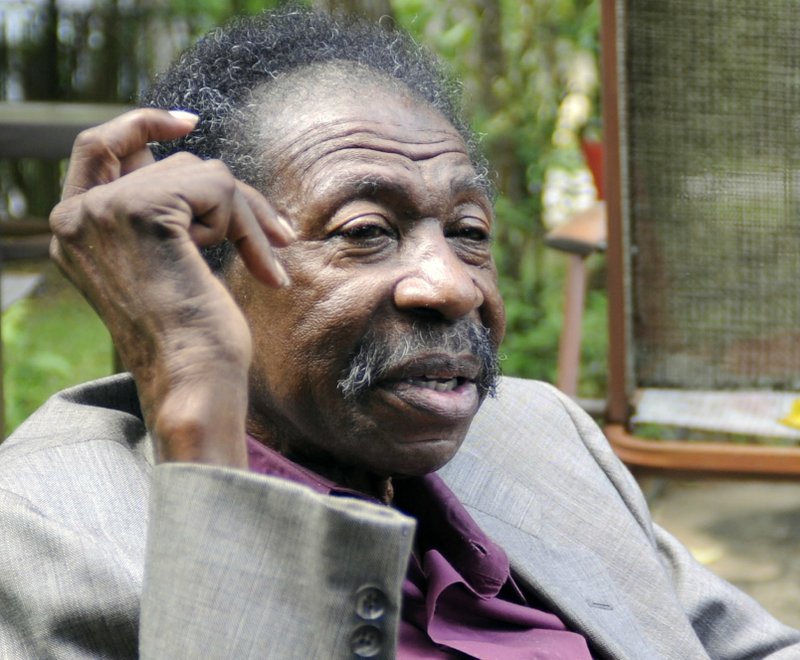
Bruce Carver Boynton, a civil rights pioneer from Alabama who inspired the landmark “Freedom Rides” of 1961, has died. He was 83. Former Alabama state Sen. Hank Sanders, a friend of Boynton’s, confirmed his passing Friday. Boynton was arrested 60 years ago for entering the white part of a racially segregated bus station in Virginia and launching a chain reaction that ultimately helped to bring about the abolition of Jim Crow laws in the South. Boynton contested his conviction, and his appeal resulted in a U.S. Supreme Court decision that prohibited bus station segregation and helped inspire the “Freedom Rides.” Despite his pivotal role, Boynton was not as well known as other civil rights figures. Yet both his mother and father were early civil rights activists. His mother, Amelia Boynton Robinson, was savagely beaten while demonstrating for voting rights in 1965 and was honored by then-President Barack Obama 50 years later. “He did something that very few people would have the courage to do. He said no,” U.S. District Judge Myron Thompson said of Boynton in 2018. “To me, he’s on a par with Rosa Parks,” the Black woman who refused to give up her bus seat to a white man. Boynton described his arrest in a 2018 interview with The Associated Press. Boynton was attending law school at Howard University in Washington, D.C. when he boarded a bus bound for Alabama in 1958. Public facilities including bus stations were separated by race across the South at the time, despite federal laws banning segregation in interstate travel. The bus pulled into a station in Richmond, Virginia, for a break, and Boynton went inside to eat. Seeing that the part of the restaurant meant for blacks had water on the floor and looked “very unsanitary,” Boynton said he sat down in the “clinically clean” white area. He told the waitress he would have a cheeseburger and tea. “She left and came back with the manager. The manager poked his finger in my face and said … move,’” using a racial slur, Boynton recalled in the interview. “And I knew that I would not move, and I refused to, and that was the case.” Convicted of trespassing, Boynton appealed and his case wound up before the Supreme Court. Thurgood Marshall, then the nation’s leading civil rights attorney and later on to become the first Black Supreme Court justice, was his counsel. Boynton contested his conviction and the Supreme Court ruled in 1960 that federal discrimination prohibitions barring segregation on interstate buses also applied to bus stations and other facilities linked to interstate travel. The next year, dozens of black and white students set out on buses to travel the South and test whether the ruling in the case, Bruce Boynton v. Virginia, was being followed. The “Freedom Riders” were arrested or attacked in Alabama, Mississippi, and South Carolina, and a bus was burned. Then-President John F. Kennedy ordered stricter enforcement of federal anti-discrimination laws. “He was a pioneer,” said Sanders. “All of the Freedom Rides sprung from this particular action.” Sanders said Boynton paid a price for what he did, and initially wasn’t able to get a law license in Alabama. He spent most of his career as a civil rights attorney before retirement. Thompson said in 2018 that Boynton’s life “is a teaching lesson for all of us about how we can make a difference.” “All he wanted was a cheeseburger, and he changed the course of history.” Republished with the permission of the Associated Press.
Donald Trump picks conservative Amy Coney Barrett for Supreme Court
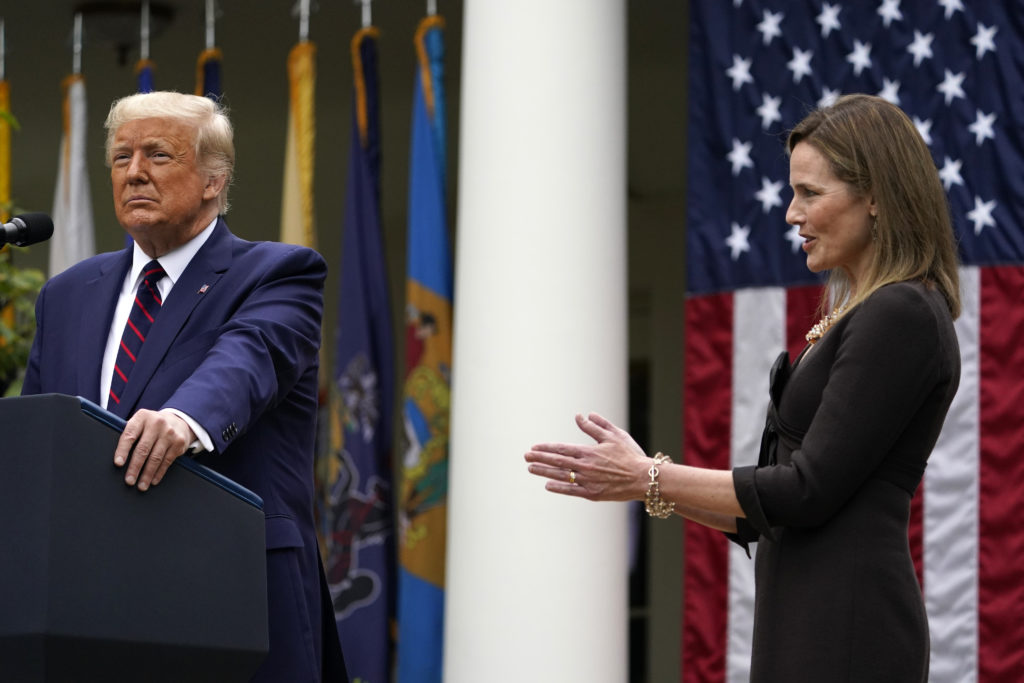
President Donald Trump nominated Judge Amy Coney Barrett to the Supreme Court on Saturday, capping a dramatic reshaping of the federal judiciary that will resonate for a generation and that he hopes will provide a needed boost to his reelection effort. Republican senators are already lining up for a swift confirmation of Barrett ahead of the Nov. 3 election, as they aim to lock in conservative gains in the federal judiciary before a potential transition of power. Trump, meanwhile, is hoping the nomination will serve to galvanize his supporters as he looks to fend off Democrat Joe Biden. Trump hailed Barrett as “a woman of remarkable intellect and character,” saying he had studied her record closely before making the pick. “I looked and I studied, and you are very eminently qualified,” he said as Barrett stood next to him in the Rose Garden. An ideological heir to the late conservative Justice Antonin Scalia, Barrett would fill the seat vacated after the Sept. 18 death of liberal icon Ruth Bader Ginsberg, in what would be the sharpest ideological swing since Clarence Thomas replaced Justice Thurgood Marshall nearly three decades ago. She would be the sixth justice on the nine-member court to be appointed by a Republican president, and the third of Trump’s first term in office. For Trump, whose 2016 victory hinged in large part on reluctant support from conservative and white evangelicals on the promise of filling Scalia’s seat with a conservative, the latest nomination in some ways brings his first term full circle. Even before Ginsburg’s death, Trump was running on having confirmed in excess of 200 federal judges, fulfilling a generational aim of conservative legal activists. “This is my third such nomination after Justice Neil Gorsuch and Justice Brett Kavanaugh, and it is a very proud moment indeed,” Trump said in the Rose Garden. Trump joked that the confirmation process ahead “should be easy” and “extremely non-controversial,” though it is likely to be anything. No court nominee has been considered so close to a presidential election before, with early voting already underway. He encouraged Democrats to take up her nomination swiftly and to “refrain from personal and partisan attacks.” In 2016, Republicans blocked President Barack Obama’s nomination of Merrick Garland to the Supreme Court to fill the election-year vacancy, saying voters should have a say in the lifetime appointment. Senate Republicans say they will move ahead, arguing the circumstances are different now that the White House and Senate are controlled by the same party. Senate Majority Leader Mitch McConnell said the Senate will vote “in the weeks ahead” on Barrett’s confirmation, adding that Trump “could not have made a better decision” in nominating the appellate court judge. The announcement came before Ginsburg was buried beside her husband next week at Arlington National Cemetery. On Friday, she was the first woman to lie in state at the Capitol, and mourners flocked to the Supreme Court for two days before that to pay respects. The set design, with large American flags hung between the Rose Garden colonnades, appeared to be modeled on the way the White House was decorated when President Bill Clinton named Ginsburg as his nominee in 1993. Barrett said she was “truly humbled” by the nomination, adding that she would be “mindful of who came before me.” She praised Ginsburg upon accepting the nomination, saying, “She has won the admiration of women across the country and indeed all across the world.” Within hours of Ginsburg’s death, Trump made clear he would nominate a woman for the seat, and later volunteered he was considering five candidates. But Barrett was the early favorite, and the only one to meet with Trump. Barrett has been a judge since 2017 when Trump nominated her to the Chicago-based 7th U.S. Circuit Court of Appeals. But as a longtime University of Notre Dame law professor, she had already established herself as a reliable conservative in the mold of Scalia, for whom she clerked in the late 1990s. She would be the only justice on the current court not to have received her law degree from an Ivy League school. The eight current justices all attended either Harvard or Yale. The staunch conservative had become known to Trump in large part after her bitter 2017 appeals court confirmation included allegations that Democrats were attacking her Catholic faith. The president also interviewed her in 2018 for the vacancy created by the retirement of Justice Anthony Kennedy, but Trump ultimately chose Brett Kavanaugh. Trump and his political allies are itching for another fight over Barrett’s faith, seeing it as a political windfall that would backfire on Democrats. Catholic voters in Pennsylvania, in particular, are viewed as a pivotal demographic in the swing state that Biden, also Catholic, is trying to recapture. While Democrats appear powerless to stop Barrett’s confirmation in the GOP-controlled Senate, they are seeking to use the process to weaken Trump’s reelection chances. Barrett’s nomination could become a reckoning over abortion, an issue that has divided many Americans so bitterly for almost half a century. The idea of overturning or gutting Roe v. Wade, the landmark 1973 decision that legalized abortion, has animated activists in both parties for decades. Now, with the seemingly decisive shift in the court’s ideological makeup, Democrats hope their voters will turn out in droves because of their frustration with the Barrett pick. Trump has also increasingly embraced the high court — which he will have had an outsize hand in reshaping -– as an insurance policy in a close election. Increases in mail, absentee, and early voting brought about by the coronavirus pandemic have already led to a flurry of election litigation, and both Trump and Biden have assembled armies of lawyers to continue the fight once vote-counting begins. Trump has been open about tying his push to name a third justice to the court to a potentially drawn-out court fight to determine who will be sworn in on Jan. 20, 2021. “I think this


